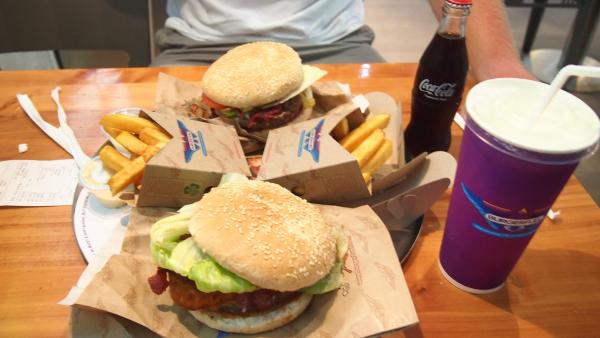Running with Moe May 14

Back in the mid-1960’s Tuft’s University professor, Dr. Jean Mayer, coined a phrase of “creeping overweight”. The research he had done with nutrition and weight control demonstrated that as a person ages they tend to gain weight.
I haven’t heard that term in many years, even when the latest research has shown that overweight and obesity amongst people has reached almost 70% of the population. This May issue of “Nutrition Action” had a brief paragraph on “Keeping the lungs young” that referred to problems with weight gain as a person gets older.
The research involved 3,673 adults between the ages of 20 to 44 over a 20 year period. The finding showed that lung capacity dropped in adults whose weight gain was ‘moderate’ (up to 2 pounds) and ‘high’ (more than 2 pounds) per year than in those who stayed at a healthy weight. The last sentence in the paragraph stated, “Try to keep weight from creeping up over time.” There was Dr. Mayer’s “creeping overweight” being true even today.
I have been active in sports most of my life and started to recall the different sports and the role of weight in each of them. In wrestling there was always a weight class that you had to weigh in for competition. I wrestled at 157 pounds. I usually weighed about 165 pounds. Each day in practice I lost about 8 pounds from sweat and exercise. At supper I drank lots of fluid, ate a healthy meal, and gained that 8 pounds back. I lost 8 pounds a day, every day, except it was the same 8 pounds. The day before a meet I would not drink fluid or eat and weighed in at 157 pounds. A fellow wrestler I once knew was a bodybuilder and weighed 185 pounds at the start of the season. He also wrestled at 157 pounds. He went from a 32 inch waist size to 28 inches. After the season he went back to the gym and weights. He ate healthy meals and within three weeks he was back to 185 pounds. He had that weight control down to a science.
In college I always wanted to weigh 180 pounds as a running back. I worked out all summer and got up to 175 pounds. When I played football the practice of the day was, “Don’t drink water because you will get stomach cramps.” Practice in August hot weather with football pads on meant that a player lost a lot of weight from sweat. We were given a couple of salt tablets to replace the sodium we lost during practice. At supper it was a quart of milk to start with to quench the thirst. After filling up with all that milk I was not that hungry and did not eat a big meal. Within two weeks I was down to 160 pounds. An entire summer’s work was gone in two weeks.
When I was a strength coach for the Hartford Whalers in the NHL the players were weighed before and after practice. The average weight loss after practice was around five pounds. The people who did the weigh-ins were scouts for the team and were all ex-players from years ago. They would comment, “When I played we lost around 10 to 12 pounds every practice. These players today are not working hard enough.” The difference was when they played the ‘no water during practice’ was in effect. The players today drink water throughout the entire practice and do not lose as much weight.
When I ran marathons my best weight was between 152 and 155 pounds. Friends that knew me from my weightlifting size of around 165 pounds kept asking me, “Are you okay?” That skinny frame and drawn face from running 20+ miles on the weekend may have made me look like a sick person, but I was very healthy. You did not want to carry any extra pounds trying to run 26.2 miles. That lighter weight was what I needed for the sport.
After my marathon running phase I started power lifting. I eventually weighed 198 pounds. My weight class was 181 pounds. I usually hung around that weight so losing five pounds or so was not that difficult. But, going from 155 pounds to 185 pounds was not so much a “creeping overweight” as a “sprinting overweight”. It was all muscle, but still overweight on the health charts.
The power lifting was the last sport that I competed in. My activity level dropped off after I reached the age of 65. The problem is that as a person ages their metabolism slows, the absorption of nutrients from food becomes less, and losing weight is not that easy anymore. I weigh about 178 pounds now.
Every year, for the past three years, I make a New Year’s Resolution to lose weight to 165 pounds. I have made that resolution for three years and the way this year is going I will make that same resolution next year. As you can see my body weight experience has been all over the charts. I work out enough to keep that ‘creeping overweight’ from getting out of control. But wanting to lose another 10 – 15 pounds is not as easy as it was when I was younger.
I’m hoping that this column, and the paragraph I read referring to aging and weight gain makes me more determined to make the resolution come true this year.



